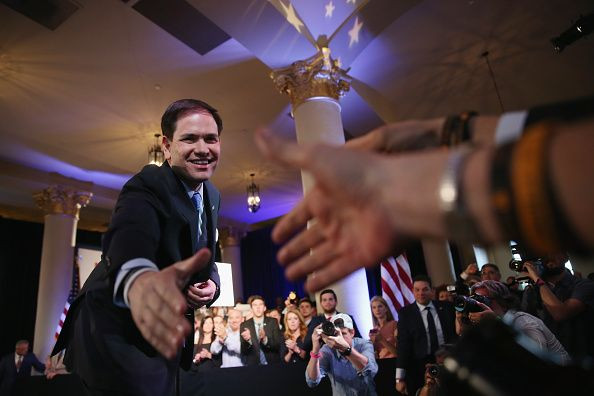Election 2016: Marco Rubio Echoes Barack Obama, Running On 'Improbable' Life Story And Generational Change

WASHINGTON -- Republicans have spent the last seven years arguing a guy who was a state lawmaker, one-term senator and who gives a good speech doesn't have the qualifications to run the White House. That line of attack presents a challenge for Florida Sen. Marco Rubio, the GOP's newly announced presidential candidate, who has a résumé that looks a whole lot like President Barack Obama’s.
But instead of running away from the similarities, Rubio seemed to be reading from the Obama playbook. In announcing his candidacy in Miami Monday, the son of Cuban immigrants sounded a lot like the son of a single mom, a man whose unusual biography helped him win the White House.
Rubio described his political rise as "improbable" and called America "the one place on earth" where someone with his background could possibly conceive of being president. If you feel like you've heard that before, it's because you have.
Like Obama, Rubio seems to be predicating much of his campaign on his compelling personal narrative and his ability to present himself as an agent of change.
“The time has come for our country to lead toward a new American century,” Rubio said to a cheering crowd in Miami’s Freedom Tower. “This election is not just about what laws we will pass, this election is a generational choice about what kind of country we will be.”
"Generational," of course, is a slap at 67-year-old Hillary Clinton -- and 62-year-old Jeb Bush.
At 43, Rubio is two years younger than Obama was when he started his White House run. Both served as state lawmakers. Both spent less than a full term in the Senate. And both refused to defer to their party's older candidates and take a place in line behind them.
Several GOP candidates -- Bush, Scott Walker and Chris Christie, among them -- will argue their experience qualifies them for the White House. But Rubio dismissed the idea he should wait his turn: “I cannot, because I believe our very identity as a nation is at stake,” he said.
And while the policies Rubio noted in his announcement speech echoed those of other likely Republican candidates -- "Repeal and replace Obamacare," opposition to abortion, lessening government regulation -- his tone and positioning differentiated him from Bush, Ted Cruz and Rand Paul.
Offering himself as a fresh start makes sense for any candidate running against the incumbent party. And if he ends up facing Clinton, it could carry even more weight.
In announcing her campaign Sunday, Clinton “made a promise to take us back to yesterday,” Rubio said. “Yesterday is over and we’re never going back.” He also appeared to swipe at Bush, although not by name, saying the nation’s leaders were “stuck in the 20th century.”
As Obama faced down front-runner Clinton in 2008, Rubio will have to defeat the better-known, better-funded Bush. Party analysts don't see that as an impossible task.
"If Jeb represents the long-known power hitter within the GOP field, Senator Rubio is the heralded top prospect getting his call up to the big leagues,” Republican strategist Joe Brettell said. “From speaking ability to familiarity with foreign policy issues, he has the most potential of any candidate -- the question is whether that potential can be immediately converted into ability to handle the big stage."
Republican strategist Joe Kildea, who worked for Jon Hunstman's and George W. Bush's campaigns, agreed. "After spending years in the Florida Legislature and the Senate and recently leading nonlibertarian conservative foreign policy, the charge that Senator Rubio is inexperienced won’t stick," Kildea said. "Like any politician, Rubio has his vulnerabilities, but he also has energy, a great team, a decent path to the nomination, and even if he doesn’t win, he’d be on the VP shortlist and the likely 2018 Florida gubernatorial nominee. "
© Copyright IBTimes 2024. All rights reserved.





















